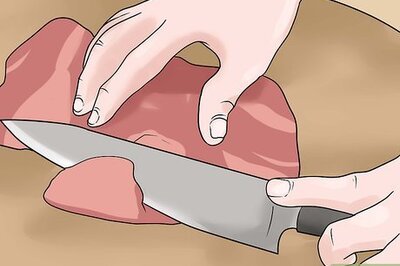
views
CHENNAI: It was a sea of humanity on the shores of Mahabalipuram as thousands of men, women and children from Irula community gathered to pay obeisance to their goddess Kaniamma on a full moon day known as Masi Makkam.The sound of waves could hardly be heard, as night on the shores of Mahabalipuram wore a festival look with shopkeepers selling wares to the Irulas who are having a sort of reunion with tradition every year.More than an estimated 25,000 people from the tribal community, including those in Andhra Pradesh, Krishnagiri, Salem and places nearby Chennai gathered on this occasion to pay obeisance to the goddess whom Irulas feel left them and came towards shore. Forty-year-old Selvi, who is from the community, says that the Irulas, who are from a matriarchal society, buy new vessels and cook food prior to the morning where they offer the prayer to the goddess on the beach.The traditional rituals, which include symbolic building of seven steps on sand and offering of seven coconuts and seven camphors, may be old enough but the irony is will the gathering place of Irulas survive the onslaught of urbanisation. “This is a traditional land for Irulas. This is the only festival which unites us. We want the government to protect it,” says Selvi, who also belongs to Irula Tribal Women Welfare Society. Interestingly, urbanisation is also slowly eroding the Irula culture, the once rat and snake catchers. It is also sowing the evils which were absent in Irula culture. “Grooms are now demanding dowry which was unheard of among Irulas,” says a shy-looking Kathirvel.“Earlier, a groom’s side gives a crowbar or a sickle to the bride’s family but with the changing times grooms are demanding hefty dowry,” says Kathirvel.Interestingly, the Irulas living in coast and hills are the backward lot and hardly has access to education. Selvi says a common man is surprised if his child catches a snake but we Irulas are surprised if our children get education. But things are changing in the plains. At the festival one could see educated well off Irulas like Muthukumar who feel the community in the plains is slowly losing its traditional culture. “Now inter-caste marriages are happening and the well off Irulas refuse to claim themselves as Irulas,” he says. He also attributes the dwindling of Irulas in plains to the government officials apathy to provide them with the community certificate. “They deny us community certificate stating that we don’t know to catch rats and snakes,” alleges Muthukumar.Thriving tattoo business and a festival of freedomThe business was brisk for tattoo artists and bangle vendors as
Irulas from different walks of life were flocking to have the names of
their loved ones inscribed on the chest and hands while women were busy
buying bangles.But then the shops were also working as a means to
identify bonded labourers from the Irula community. “The festival serves
as a platform to identify bonded labourers,” says Kural Amuthan,
community relations manager of International Justice Mission.“We
provide the tattoo artists and bangle vendors with forms. Those Irulas
who could be bonded labourers are identified and our team tries to track
them through their mobile phones,” says Hepzhibah, director of
government and community relations in IJM. “We have come across 3,784
cases of bonded labour and almost 99 per cent of them are from the Irula
tribe,” says Kural. Mariammal and Venkatesh, who were rescued last year
from a rice mill, recount the horror they have undergone during their
bondage. “They abused us and never let us out. It was only IJM which
gave us a new life,” says Venkatesh, who is now working as a
construction labour. Meanwhile, a play is enacted by the rescued
Irulas who highlight their plight and spread awareness among the
community against bonded labour.“Now the Irulas, who just live for
the day are thinking about the future. They want their children to be
educated so that they don’t end up as bonded labourers,” says Kural.




















Comments
0 comment